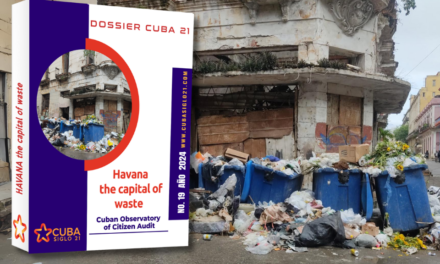Descargar Dossier Completo en español
Download Complete Report in English
It is increasingly common to hear Cubans say that Cuba is the same or worse than Haiti. In Cuba, with a different history than Haiti, the implementation of a totalitarian system after 1959 generated the basis for the current deplorable state of affairs. As a result, Cuba, from one of the most progressive Latin American countries up to that date, in the year 2024 approaches Haiti: the most backward country in the Western Hemisphere. A setback, which I have called Haitianization, demonstrating that peoples with different histories and conditions can reach similar situations through different paths.
Why Haitianization? Because of the increasing deterioration of the country: increasing social inequality; cities like Havana, once flourishing, now in ruins; streets overcrowded with garbage because its collection does not work, and more and more people rummaging in the containers in search of food or anything “useful”; poorly dressed Cubans; destroyed streets and sidewalks; schools and hospitals in deplorable condition; increasing collapse of housing; serious deterioration of hospital and educational assistance; significant decrease in transportation; shortages and high cost of food; lack of prospects reflected in the growing mass exodus; proliferation of the black market and MSMEs, with products at prices unaffordable for most Cubans; and a State incapable – or reluctant?- to guarantee the basic needs of the population.
In February 1959, Fidel Castro, having failed to fulfill the commitment made in 1953 at the trial for the assault on the Moncada Barracks, to hold free elections and restore the 1940 Constitution, announced that: “agricultural production would increase notably, the consumption capacity of the peasant population would double and Cuba would erase its dreadful chronic unemployment, achieving for the people a standard of living higher than that of any other nation”[1] . However, the revolutionary government dismantled civil society, eradicated private property, suppressed liberties, and implemented a totalitarian system with which the citizen, an active and essential agent for social progress, disappeared.
The inefficiency of the centralized economy was recognized in 2018 by the Comptroller of the Republic: of 402 companies checked 39% were evaluated as bad and 19% as deficient, with losses of more than 2 billion pesos[1] , double that detected the previous year, when 369 companies showed losses of 1 057 million. Meanwhile, the Cuban Observatory of Citizen Audit (OCAC), an independent entity dedicated to research and analysis of critical issues of Cuban society, in its analysis of the first half of 2023 shows an escalation of crimes and violent crimes[2] , whose growth, step by step, cuts the distance with the situation in Haiti.
Violence in Cuba has been exercised for years by the totalitarian nature of the State. Coupled with the misery described above, it has boosted individual violence (assaults, theft of motorcycles, cell phones and murders) and domestic violence (increase in femicides and other manifestations; although it is not comparable to that of Haiti or other countries in the region, it indicates that its growth and generalization points to a situation like that of Haiti.
As a result of the arbitrary policy of the Government, the social tranquility, which characterized Cuba for decades, turned into punctual manifestations of protests, and in 2021 became a generalized demand for liberties; an unprecedented event in our history and indicative of the rebirth of civic behaviors. In the face of the government’s inability to stop the regression, despite having maintained governability through the use of force, as became evident with the Cuban president’s call to the “revolutionaries” to repress peaceful demonstrators in July 2021 as in a civil war. One thousand of the protesters remain convicted and imprisoned for making use of the universal right of public demonstration. This means that, if structural changes are not introduced in the short term, this precarious governability will give way to increasing ungovernability, whose germs in gestation will accelerate with the present economic “package”.
The unjustified insistence on preserving the so-called “socialist” state enterprise as an essential link in the economy to keep private forms of production subordinated to an inefficient state property system, together with the concentration of public powers in a State-Party-Government, formed by an elite alien to the interests and needs of the people, are among the fundamental causes of the path that is leading Cuba towards Haitianization.
As the new Movement for the 5 Freedoms points out, the de-totalization of Cuba is an essential and urgent priority. Removing the totalitarian regime is the only feasible option to stop and reverse the current dangerous course towards the very disintegration of the Cuban nation.
[1]Total Currency. Deformation generated by the monetary duality that designates the sum -one by one- of CUC and CUP in business calculations, although in current transactions the CUC is worth 24 times more than the CUP.
[2] Informe de inseguridad pública en Cuba enero – junio de 2023, OCAC, agosto 2023 https://cubasiglo21.com/informe-de-inseguridad-publica-en-cuba-enero-junio-de-2023/
[1] Luis María Buch. Gobierno Revolucionario Cubano: génesis y primeros pasos, La Habana, Editorial de Ciencias Sociales, 1999, p.80.







